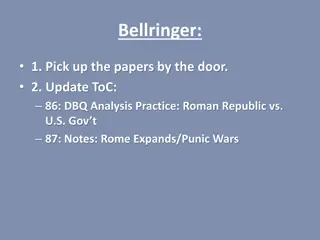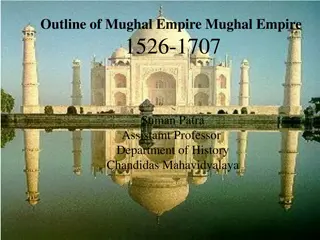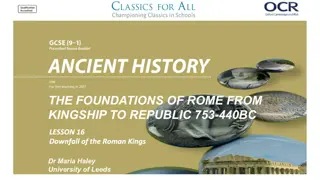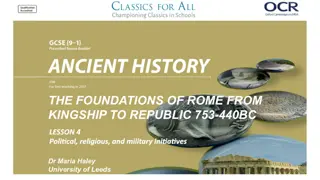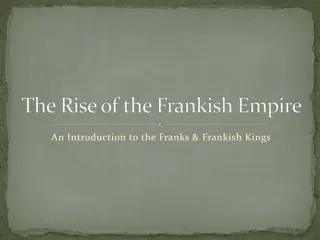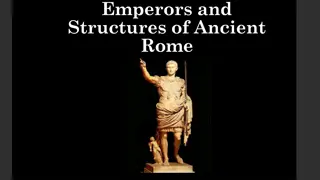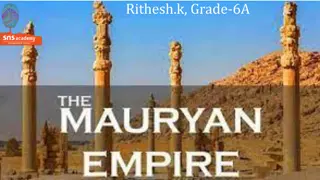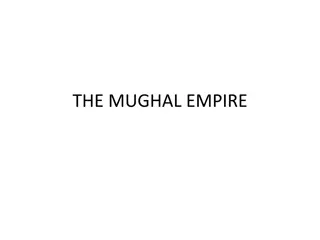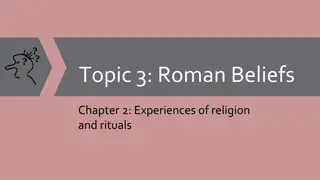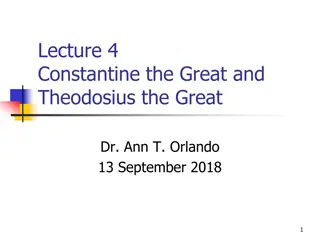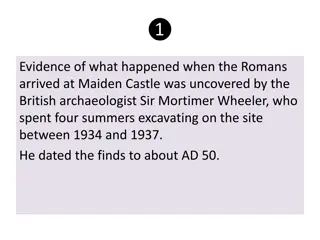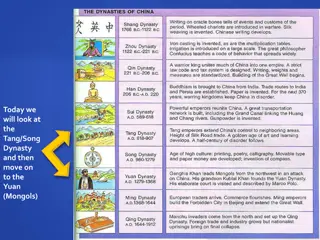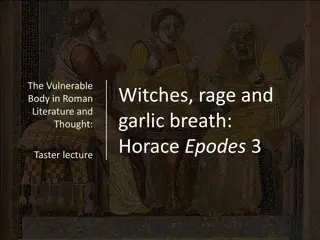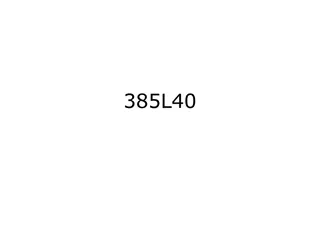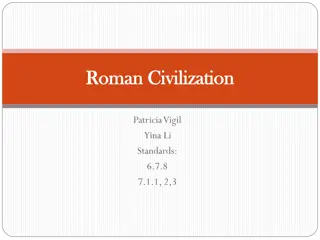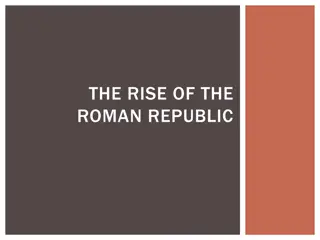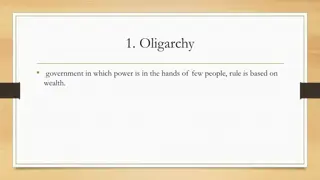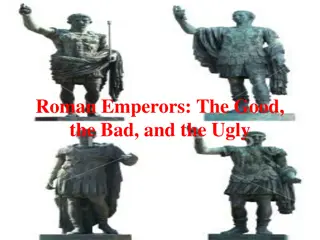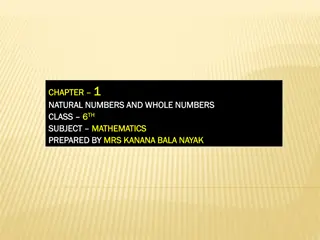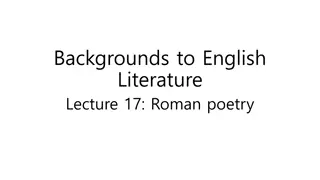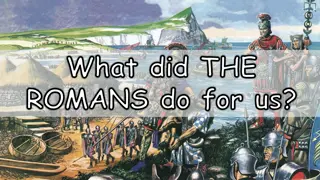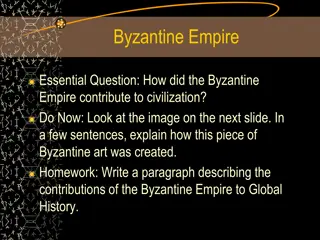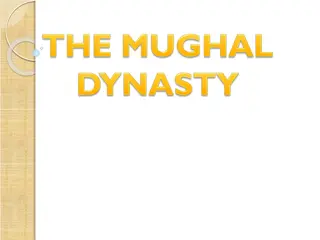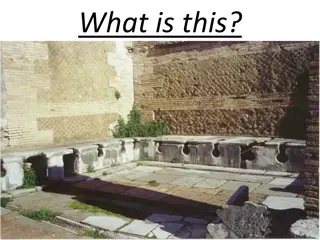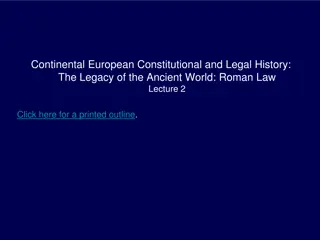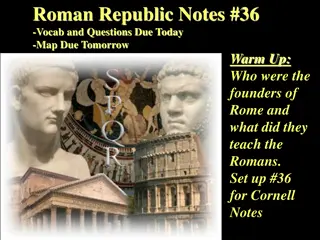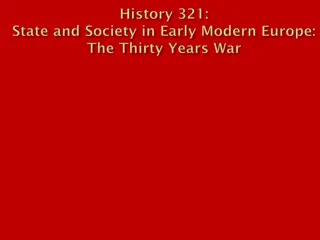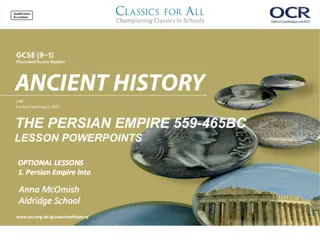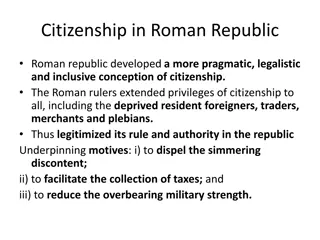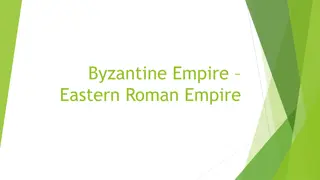Read⚡ebook✔[PDF] Blood of the Provinces: The Roman Auxila and the Making of Pro
\"COPY LINK HERE ; https:\/\/getpdf.readbooks.link\/0198795440\n\n[PDF READ ONLINE] Blood of the Provinces: The Roman Auxila and the Making of Provincial Society from Augustus to the Severans | Blood of the Provinces: The Roman Auxila and the Making of Provincial Society from Augustus to the Severan
2 views • 6 slides
READ⚡[PDF]✔ European Mail Armour: Ringed Battle Shirts from the Iron Age, Roman
\"COPY LINK HERE ; https:\/\/getpdf.readbooks.link\/9463721266\n\nDOWNLOAD\/PDF European Mail Armour: Ringed Battle Shirts from the Iron Age, Roman Period and Early Middle Ages (Amsterdam Archaeological Studies) | European Mail Armour: Ringed Battle Shirts from the Iron Age, Roman Period and Early
11 views • 6 slides
Evolution of Property Transfer in Roman Law
Comparative Property Law explores the evolution of property transfer in Roman law. In classical Roman law, property transfer required an external act of delivery. Over time, formal acts like mancipatio and traditio became common for property transfer. During the Justinian period, traditio became the
3 views • 24 slides
Roman Republic Expansion and Punic Wars Overview
Learn about the Roman Republic's expansion from 350 B.C.E. to 150 B.C.E., including their policies towards conquered territories, trade networks, and conflicts with Carthage in the Punic Wars. Explore key aspects of Roman society, politics, economics, and culture during this period through bellringe
1 views • 32 slides
Outline of Mughal Empire Mughal Empire 1526-1707.
The Mughal Empire in India from 1526 to 1707 was a significant period marked by notable rulers such as Babur, Humayun, Akbar, Jehangir, Shah Jehan, and Aurangzeb. These emperors each contributed differently to the empire's development, with highlights including military conquests, administrative ref
7 views • 14 slides
Insights into Roman Medicine and Writers of Antiquity
Explore the rich history of Roman medicine and literature through the writings of influential figures like Pliny the Elder. Discover how Roman cures for ailments were associated with treatments such as baths and exercises. Uncover fascinating details about medical practices, including the first phys
0 views • 15 slides
The Downfall of the Roman Kings: Lucretia's Role in Establishing the Republic
The Rape of Lucretia by Sextus Tarquinius was a key event leading to the downfall of the Roman kings and the establishment of the Republic. Lucretia's character, representing chastity and virtue, inspired Brutus to take a stand against the tyrannical rulers. Brutus's impassioned speech and vow marke
2 views • 6 slides
Comparative Analysis of Roman Foundational Myths
The task involves analyzing the foundation myths of Rome, focusing on the development, religious, and military initiatives. By comparing Livy and Dionysius' interpretations of Romulus's contributions, considering issues of trustworthiness, and creating infographics on Roman hierarchy and omens, stud
0 views • 6 slides
The Rise of the Frankish Empire: A Journey Through History
Explore the fascinating history of the Frankish Empire from the conquest of Gaul by the Franks in the 5th century to the reign of Charlemagne as the Holy Roman Emperor. Discover key events such as Clovis I's unification of the Franks, Charles Martel's victory at the Battle of Tours, and Charlemagne'
4 views • 6 slides
Historical Origins and Formation of German Law: Influence of Roman Law
The historical origins and formation of German law were shaped significantly by the late contact with Roman law during the Medieval and Renaissance period. The weak central imperial power, rising influence of territorial rulers, and the lack of a common legal system in Germany prompted the appeal fo
0 views • 23 slides
Notable Emperors and Structures of Ancient Rome
Julius Caesar, Augustus Caesar, Hadrian, Marcus Aurelius, Diocletian, and Caligula were significant figures in ancient Rome, each with their own contributions and characteristics. From Julius Caesar's military prowess to Augustus Caesar's establishment of the Roman Empire, and Hadrian's emphasis on
0 views • 11 slides
Overview of Mauryan Empire: Chandragupta, Bindusara, and Ashoka
Mauryan Empire, established by the Mauryas, was the first major empire in India, encompassing a vast territory and surpassing previous dynasties in land control. Chandragupta Maurya, Bindusara, and Ashoka were key emperors who shaped the empire's history. Chandragupta, supported by Chanakya, conquer
0 views • 13 slides
The Mughal Empire: History and Legacy
The Mughal Empire was founded by Babur, a skilled statesman and conqueror. His military conquests paved the way for the empire's expansion in India. Babur's son Humayun faced challenges during his reign, leading to a period of instability. Despite difficulties, the Mughal Empire left a lasting impac
0 views • 13 slides
Unveiling Roman Britain: Lessons on Inscriptions and Everyday Life
Delve into the world of Roman Britain through inscriptions, exploring the lives of its inhabitants. Lesson 2 focuses on deciphering inscriptions to unveil historical insights. Learn to craft historically-valid questions using key words and understand how these artifacts reveal details about everyday
0 views • 13 slides
Roman Beliefs and Religious Practices in Pompeii
Explore the diverse experiences of Roman religion in Pompeii, where worship of multiple gods was common and individuals had the flexibility to honor both official and personal deities. Learn about the tolerant attitude towards religious differences in the Roman Empire and how beliefs evolved over ti
1 views • 6 slides
Overview of Early Christian Martyrs in the Roman Empire
Explore the historical context of early Christian martyrs in the Roman Empire, starting from the first century with the reign of Augustus to the turmoil and persecutions in the third century under emperors like Diocletian. Learn about the Roman religion, the Five Good Emperors, and the social dynami
0 views • 24 slides
Exploring Roman Civilization: Contributions and Daily Life
Delve into the intriguing world of ancient Rome through a visual journey showcasing the impact of Roman civilization. Discover the architecture, art, infrastructure like roads and drains, calendar systems, coins, and the luxurious baths they enjoyed. Uncover the influence of the Roman Empire on vari
0 views • 20 slides
The Transformation of the Roman Empire: Constantine and Theodosius
The lecture delves into the significant reigns of Constantine the Great and Theodosius the Great in the context of the Roman Empire's historical changes. It explores the social and ecclesial impact brought about by Constantine's policies and examines the political landscape during the early fourth c
0 views • 29 slides
Uncovering Evidence of Roman Arrival at Maiden Castle by Sir Mortimer Wheeler
British archaeologist Sir Mortimer Wheeler excavated Maiden Castle between 1934 and 1937, uncovering evidence of the Roman arrival around AD 50. The site revealed insights into the Roman invasion in AD 43, showcasing advanced Roman equipment like the ballista. The discovery included carefully buried
0 views • 6 slides
Understanding the Roman Missal - Celebrating the Eucharist
Explore the significance of the Roman Missal in understanding and navigating the celebration of the Eucharist within the Catholic Church. Delve into the theological premises, participation of the faithful, and Christ's transformative presence in the liturgy. Discover the core themes and roles outlin
0 views • 33 slides
Rise and Legacy of the Mongol Empire
The rise of the Mongol Empire under Genghis Khan, the unification of Mongols, conquests, and the establishment of the Yuan Dynasty by Kublai Khan are highlighted. The Mongols' military prowess, organizational skills, and cultural adaptability led to the largest land empire in history. The Pax Mongol
0 views • 11 slides
Exploring Vulnerability and Power in Roman Literature: Horace's Epodes and More
Delve into the themes of vulnerability, power, and fragility in Roman literature through the works of Quintus Horatius Flaccus, known as Horace. Explore the use of witches, garlic breath, and rage in his Epodes, while also examining the broader concepts of aging, modern parallels, and societal chall
0 views • 9 slides
Roman Political History: From Rise of Pompey to Reign of Augustus
In the tumultuous period of Roman history from the rise of Pompey to the reign of Augustus, we witness pivotal events such as the Alliance of the First Triumvirate, the civil war between Pompey and Julius Caesar, Caesar's assassination, the rise of Octavian, and the establishment of the Second Trium
0 views • 20 slides
Roman Civilization Overview
Roman civilization was influenced by Greek culture, as seen in their art, literature, and architecture. Roman artists and writers borrowed ideas from the Greeks but adapted them to suit their needs. They created realistic statues, innovative buildings with features like arches and domes, and iconic
0 views • 36 slides
The Rise of the Roman Republic and Political Evolution in Ancient Rome
The Roman Republic emerged in 509 B.C.E. as a form of government with elected leaders, initially only accessible to Patricians. This led to a division between Patricians and Plebeians, the latter being the majority of the population. The Senate, Consuls, and Tribunes played key roles in shaping Roma
0 views • 17 slides
Key Historical Concepts and Contributions
Explore various historical concepts like oligarchy, Pax Romana, consulship, roles of patricians in Roman government, Hellenistic culture, mathematical contributions by Pythagoras and Euclid, origin of Zoroastrianism in the Persian Empire, major characteristics of the Roman Empire and Greece, geograp
0 views • 20 slides
Roman Emperors Through History: The Good, the Bad, and the Ugly
Explore the fascinating history of Roman emperors, from the wise and just rulers like Augustus and Marcus Aurelius to the tyrannical and infamous ones such as Caligula and Nero. Learn about their achievements, controversies, and ultimate fates, shaping the course of the ancient Roman Empire.
0 views • 10 slides
Understanding Natural Numbers, Whole Numbers, and Roman Numerals
This chapter delves into the concepts of natural numbers, whole numbers, and Roman numerals. It covers the basics of numeral systems, properties of whole numbers, and rules for Roman numerals. Learn about counting numbers, place value, successors, predecessors, and more to build a strong mathematica
0 views • 11 slides
Overview of Roman Poetry and The Eclogues: A Study in Roman Literature
Roman poetry encompassed various genres such as epic, drama, lyric, satire, and pastoral, with poets like Virgil and Catullus making significant contributions. The neoteric poets, inspired by Hellenistic traditions, added a new dimension to Roman poetry. The Eclogues by Virgil, drawing from Theocrit
0 views • 17 slides
Exploring Roman Baths: History and Architecture
Delve into the fascinating world of Roman baths, where cleanliness and socializing intertwined. Discover the construction of Roman Bath Houses in Britain, exemplified by the Roman Baths in Bath, Somerset. Uncover the purpose of rooms like the Tepidarium and Caldarium, designed for relaxation and mus
0 views • 20 slides
The Contributions of the Byzantine Empire to Civilization
The Byzantine Empire made significant contributions to civilization through art, law, religion, and centralization of government. The empire's legacy includes the preservation of Roman laws, promotion of Christianity, accumulation of church wealth, and establishment of Constantinople as a key center
0 views • 22 slides
Overview of the Mughal Empire and Its Great Mughals
The Mughal Empire was a significant imperial power in the Indian subcontinent from 1526 to 1757, ruled by Muslim descendants of Genghis Khan. The empire extended over a vast region and produced six great Mughal rulers: Babur, Humayun, Akbar, Jahangir, Shah Jahan, and Aurangzeb. Babur was the founder
0 views • 14 slides
Exploring Ancient Roman Civilization Through Images and Text
Delve into the intriguing world of ancient Roman civilization through a collection of images and text snippets. Discover the transition from the Roman Republic to the rule of Emperors, examine the behavior of Roman figures, and ponder societal norms and practices of that era.
1 views • 17 slides
Evolution of Roman Legal System and Justinian's Codification
Roman legal history is divided into several periods, from the Archaic City-State to the Classical Principate and the Post-Classical Dominate. The codification of Roman law culminated in Justinian's Corpus Iuris Civilis, which included the Digest, Institutes, Code, and Novels. Justinian's reforms est
0 views • 35 slides
Overview of Roman Republic: Government, Society, and Power Dynamics
Explore the foundation of the Roman Republic, its growth, societal structure with Patricians and Plebeians, and power dynamics shaping its governance. Discover the roles of different social classes, voting rights, and the struggle between the nobles and regular citizens within the Roman Republic.
0 views • 15 slides
The Swedish Invasion of the Holy Roman Empire: Motives, Success, and Challenges
Sweden's invasion of the Holy Roman Empire was initially driven by political motives rather than religious reasons. The Swedish success was attributed to their military expertise and alliances, but they faced challenges due to insufficient resources and reliance on German Protestant princes. Success
0 views • 28 slides
Exploring the Ancient Persian Empire: Lessons and Tasks
Delve into the intriguing history of the Persian Empire with lessons focusing on its geography, rivals, and ruling dynamics. Engage in tasks such as chronological order puzzles, map analysis, and discussions on empire-building qualities. Uncover the complexities of the Middle East in 600 BC and the
0 views • 9 slides
Evolution of Citizenship: Roman Republic to Middle Ages
The concept of citizenship evolved from the Roman Republic's inclusive approach to a more legalistic framework detached from political agency. Post-Roman Empire, citizenship diminished, shifting focus to personal salvation in the Middle Ages. However, Italian city republics like Florence and Venice
0 views • 8 slides
The Byzantine Empire: Society, Achievements, and Decline
The Byzantine Empire, established in 527 A.C, was marked by religious conflicts and military advancements. The society was patriarchal, centered around Christianity, and had a hierarchical structure. The empire made significant progress in weaponry and trade, although frequent battles ensued. Despit
0 views • 7 slides
Byzantine Empire and Eastern Orthodox Church Overview
The Byzantine Empire, also known as the Eastern Roman Empire, flourished from 330 CE to 1453 CE under Greek rule. It played a significant role in trade, politics, and culture during the Post-Classical Era, connecting trade routes and reconquering the West under rulers like Justinian. However, challe
0 views • 9 slides
![Read⚡ebook✔[PDF] Blood of the Provinces: The Roman Auxila and the Making of Pro](/thumb/20539/read-ebook-pdf-blood-of-the-provinces-the-roman-auxila-and-the-making-of-pro.jpg)
![READ⚡[PDF]✔ European Mail Armour: Ringed Battle Shirts from the Iron Age, Roman](/thumb/20552/read-pdf-european-mail-armour-ringed-battle-shirts-from-the-iron-age-roman.jpg)

